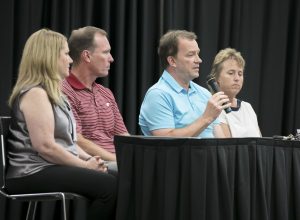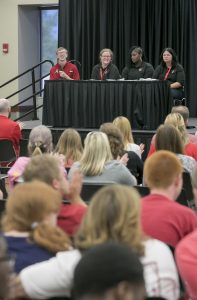Program Hosts State’s First-Ever College Fair for Individuals with Intellectual Disabilities
By David Miller
When considering the scope of supports people with intellectual disabilities need and receive in K-12 education, one could assume their needs are met: laws ensure equity, and special education programs are continually evolving as pedagogy and research practice advance. Community programs and nonprofit organizations can also help fill gaps in services and resources.

But for this population, postsecondary education often remains an unimaginable goal. Federal and state laws do not have the same reach to shape infrastructure or mandate admissions, and the variables of independent living, college curricula and socialization create a potentially expensive path with uncertain outcomes.
Mark Baker, whose daughter Olivia participated in CrossingPoints’ Summer Bridge program at UA, has carried the worries of Olivia’s education and how to fund it since she was a child. Mark was a panelist at CrossingPoints’ College Prep Summit, the state’s first-ever college fair for individuals with intellectual disabilities, on Sept. 14. He described paying “tuition and a half” for Olivia’s K-12 education, and even funding a teacher’s salary for a year because her school couldn’t.
“It’s a struggle,” Mark said.
Mark and other parents on the panel were candid about the challenges of finding a higher education program to fit their child’s needs, but also about having confidence their child could thrive in a college setting without their familiar routine and supervision. Mark is exploring options for a year-round program after Olivia recently completed Summer Bridge, a two-month simulation of college life held each year at UA.
“We’d looked at a number of other programs, but we wanted something more than a life skills program … we wanted an academic component, and we found that in Summer Bridge,” Mark said. “We weren’t sure how Olivia would function in the classroom without a peer mentor – like she had in high school. But she blossomed, her confidence grew, and she got along with people.”
Mark’s concerns mirror those of parents of typical functioning, college-bound adults, and the goal of the summit was to magnify that point: normalize every aspect of the college experience and minimize the competition aspect of college recruiting. That process begins with exploration, with the summit featuring representatives from five postsecondary programs – four affiliated with universities – from across the state.
“The panels were particularly important for the (K-12) teachers that attended the summit,” said Dr. Kagendo Mutua, CrossingPoints director. “Teachers need to start talking about postsecondary options for people with intellectual disabilities. It’s typically not a conversation they have, but if teachers are talking about it and making it part of the IEP (individualized education program) planning, students and families will begin to engage in that discussion.”
Becoming self-advocates

Parents of people with intellectual disabilities are often afraid to let their children fail, even with assurance that they can “fail safely,” said Dr. Amy Williamson, CrossingPoints coordinator.
The bedrocks of UA’s CrossingPoints program are independence and self-advocacy. Those themes are present in both tiers of the program, where decisions about activities, learning opportunities and job training are driven by the students, who communicate their wants and desires to faculty.
“Students are not given a whole lot of opportunities to practice or exercise their independence in high school,” Williamson said. “Some of that has to do with parents’ fear of logistics and things they and the schools can provide. In Summer Bridge, it may be their first time ever staying away from home, and they’re staying with us for nine weeks. It can be a difficult adjustment for parents.”
Mutua said postsecondary education goals and expectations are sometimes tempered by realities parents have experienced. Conversely, when young people talk about their aspirations, they’re far more optimistic and motivated than adults in their lives, increasing the likelihood they’ll set and achieve higher goals. Mutua said the differences underscore the importance of fostering an environment where students can advocate for themselves.
“How do you challenge people to think outside the master discourses of deficiencies and inabilities?” Mutua said. “As a professional in the field, I can talk all I want, but it’s heard differently when it’s coming from the students. When you talk to them, their desires are normative – they want to own a house, go to college and have relationships. It you’re dreaming for yourself, the typical barriers won’t exist.”
The future
The student panel at the summit expanded the self-advocacy component, offering anecdotes about student experiences, both positive and negative, in programs across the state.
Jamaica Cooper, a graduate of both tiers of the CrossingPoints program, said individuals with intellectual disabilities should attend college, to “see that anything is possible.” Cooper is currently employed by UA.
Richie Greenberg, a third-year student in the Horizons School in Birmingham, said his postsecondary education has empowered him to learn more and become independent.
“It might be more difficult for you because you have a disability, but that doesn’t mean you can’t have a proper education,” Greenberg said. “And you have to get the mindset that you’re all on your own. I’m not saying I was spoiled rotten, but our parents take care of most of our needs.”
Mutua said the student, parent and teacher turnouts are good indicators of a growing interest in postsecondary education for individuals with intellectual disabilities. Summit leaders hope to soon see students lining up visits to programs across the state.
“Most college-bound students will look at options to make a choice that is informed by what they’ve seen, and the experiences they’ve had,” Mutua said. “So the next piece is seeing that come to fruition, whereby students and families can do college visits. They need their ‘selfie’ [photo] moments.”
Hurdles remain, particularly in funding and supports for year-round programs. Some new programs in the state do not have a bridge program to explore and account for unknowns they’ll likely experience in a year-round setting. UA created its bridge program as a pilot for a year-round program it hopes to launch soon.
Mutua and CrossingPoints are leading the Alabama Postsecondary Alliance for Intellectual Disabilities to create a network of shared resources for each university and to advocate for student aid at the state level.
